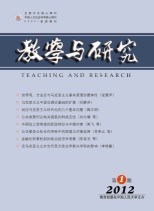|
|
Reconstruction of Totality
——On Jamesons Cultural Criticism Theory
NI Shou-Peng
2012, 47 (2):
59-64.
DOI:
Jameson attempts to give a general analysis of postmodernist culture known as antimetanarrative through application of Marxist position, views and methodology, which made him a controversial fiture in the international academic circle. This paper intends to present a critical interpretation of Jamesons cultural criticism theory of reconstruction of totality, focusing on four factors, that is, “justification of totality”, “Marxist doctrine of hermeneutics”, “aesthetic of cognitive mapping”, and “globalization and strategies of resistance” from the dimension of political thinking and the dimension of practical politics. On the whole, Jameson has adhered to Marxism with certain development. But his understanding of philosophical categories such as the subject has, to a certain extent, deviated from Marxism and got closer to postmodernism. Consequently, his theory of cultural criticism fell into a pessimistic labyrinth.
Related Articles |
Metrics
|



